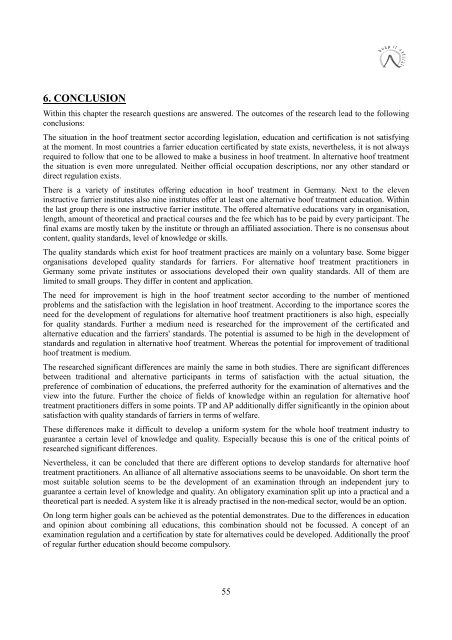Bachelor Thesis - Christina Kuenen - Hufpfleger
Bachelor Thesis - Christina Kuenen - Hufpfleger
Bachelor Thesis - Christina Kuenen - Hufpfleger
You also want an ePaper? Increase the reach of your titles
YUMPU automatically turns print PDFs into web optimized ePapers that Google loves.
6. CONCLUSION<br />
Within this chapter the research questions are answered. The outcomes of the research lead to the following<br />
conclusions:<br />
The situation in the hoof treatment sector according legislation, education and certification is not satisfying<br />
at the moment. In most countries a farrier education certificated by state exists, nevertheless, it is not always<br />
required to follow that one to be allowed to make a business in hoof treatment. In alternative hoof treatment<br />
the situation is even more unregulated. Neither official occupation descriptions, nor any other standard or<br />
direct regulation exists.<br />
There is a variety of institutes offering education in hoof treatment in Germany. Next to the eleven<br />
instructive farrier institutes also nine institutes offer at least one alternative hoof treatment education. Within<br />
the last group there is one instructive farrier institute. The offered alternative educations vary in organisation,<br />
length, amount of theoretical and practical courses and the fee which has to be paid by every participant. The<br />
final exams are mostly taken by the institute or through an affiliated association. There is no consensus about<br />
content, quality standards, level of knowledge or skills.<br />
The quality standards which exist for hoof treatment practices are mainly on a voluntary base. Some bigger<br />
organisations developed quality standards for farriers. For alternative hoof treatment practitioners in<br />
Germany some private institutes or associations developed their own quality standards. All of them are<br />
limited to small groups. They differ in content and application.<br />
The need for improvement is high in the hoof treatment sector according to the number of mentioned<br />
problems and the satisfaction with the legislation in hoof treatment. According to the importance scores the<br />
need for the development of regulations for alternative hoof treatment practitioners is also high, especially<br />
for quality standards. Further a medium need is researched for the improvement of the certificated and<br />
alternative education and the farriers' standards. The potential is assumed to be high in the development of<br />
standards and regulation in alternative hoof treatment. Whereas the potential for improvement of traditional<br />
hoof treatment is medium.<br />
The researched significant differences are mainly the same in both studies. There are significant differences<br />
between traditional and alternative participants in terms of satisfaction with the actual situation, the<br />
preference of combination of educations, the preferred authority for the examination of alternatives and the<br />
view into the future. Further the choice of fields of knowledge within an regulation for alternative hoof<br />
treatment practitioners differs in some points. TP and AP additionally differ significantly in the opinion about<br />
satisfaction with quality standards of farriers in terms of welfare.<br />
These differences make it difficult to develop a uniform system for the whole hoof treatment industry to<br />
guarantee a certain level of knowledge and quality. Especially because this is one of the critical points of<br />
researched significant differences.<br />
Nevertheless, it can be concluded that there are different options to develop standards for alternative hoof<br />
treatment practitioners. An alliance of all alternative associations seems to be unavoidable. On short term the<br />
most suitable solution seems to be the development of an examination through an independent jury to<br />
guarantee a certain level of knowledge and quality. An obligatory examination split up into a practical and a<br />
theoretical part is needed. A system like it is already practised in the non-medical sector, would be an option.<br />
On long term higher goals can be achieved as the potential demonstrates. Due to the differences in education<br />
and opinion about combining all educations, this combination should not be focussed. A concept of an<br />
examination regulation and a certification by state for alternatives could be developed. Additionally the proof<br />
of regular further education should become compulsory.<br />
55


